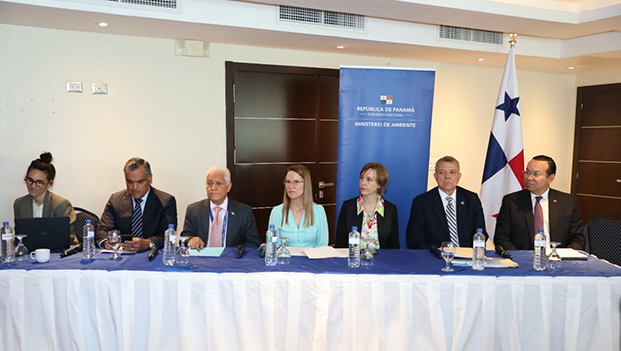- The project "Aligning the financial flows of Panama's financial sector with the climate change objectives of the Paris Agreement", funded by the Green Climate Fund and the European Union through the EUROCLIMA Programme, was launched in Panama.
- The project will create a taxonomy of sustainable finance to classify investments and economic activities that contribute to the achievement of the country's climate change objectives.
- The sustainable finance taxonomy will direct private capital towards the economic activities needed to achieve a low-emission, climate-resilient economy.
Panama, 28 March 2023 - The project "Aligning the financial flows of Panama's financial sector with the climate change objectives of the Paris Agreement" was launched today with the objective of developing a sustainable finance taxonomy in Panama and its implementation in the private financial sector. The project involves the United Nations Environment Programme (UNEP), its Finance Initiative (UNEP FI), the Ministry of Environment (MiAmbiente), the Ministry of Economy and Finance (MEF), the Superintendency of Banks of Panama (SBP), the Superintendency of Insurance and Reinsurance of Panama (SSRP), the Superintendency of the Securities Market (SMV), and the Sustainable Finance Working Group (GTFS),
Under this initiative, a framework will be developed for the mapping, quantification and disclosure of climate-related financial risks, whose methodologies and tools will also be implemented in the portfolios of banking and insurance institutions in order to assess their exposure to these risks and define strategies for their management. In this way, the Panamanian financial sector will be able to create the guiding structure for mobilising private capital towards a low-emission and climate-resilient economy and to strengthen its resilience to the effects of climate change.
In the context of achieving climate neutrality by 2050 by adding a significant private investment component, Panama's sustainable finance taxonomy will aim to guide private investment towards the economic activities necessary to achieve climate neutrality. Panama's authorities will develop the taxonomy to provide standardised, science-based, internationally harmonised criteria on when investments and economic activities can be considered environmentally sustainable.

The taxonomy aims to provide certainty to investors, avoid greenwashing, support the growth of domestic green financial markets, and increase the country's attractiveness to international investors. In this way, "the taxonomy will promote transparency and help measure the progress being made towards achieving the national climate change targets of the Paris Agreement," said Panama's Minister of Environment Milciades Concepción. "This will help direct investments to where they are most needed," he concluded.
Olga Cantillo, Executive Vice President and General Manager of the Latin American Stock Exchange (Latinex) and Secretary of the GTFS, explains that "this tool will be useful for knowing whether investments, financial products and financing are aligned with the taxonomy". She continued: "It will be used to inform financial market actors, including supervisors, about sustainable finance activity in the country.
The project "Aligning the financial flows of Panama's financial sector with the climate change objectives of the Paris Agreement" is presented in Panama City. Photo/Courtesy of MiAmbiente press.
On the other hand, Panama's economy is heavily influenced by the Panama Canal and is based on the provision of services, a sector that accounts for more than 60% of its Gross Domestic Product (GDP). Extreme events that pose a climatic threat to Panama include intense summer rains, long or intense periods of drought, as well as sea level rise. Considering the dynamics of the Panamanian economy, such hazards have shown evidence of negative economic impacts on sectors of major national interest, with potential effects on the country's financial stability.
In this regard, financial regulators that seek to safeguard the country's financial and macroeconomic stability, such as the SBP, the SSRP and the SMV are working to strengthen the resilience of the Panamanian financial sector to climate change.
"The incorporation of sustainability into the regulatory and supervisory frameworks of the financial system is becoming increasingly relevant at the international level and we, as the Panamanian banking system regulator, are committed to strengthening the management of climate-related risks in line with international standards and practices," said Panama's Superintendent of Banks, Amauri A. Castillo. "For such purposes, through the implementation of the initiative, Panamanian banking entities will be able to rely on international best practices and standards that guide the incorporation of climate change into financial risk management," he added.
On the other hand, the Superintendent of Insurance and Reinsurance of Panama, Alberto Carlos Vásquez Reyes, said that "Through the implementation of this initiative, we will contribute to the awareness of insurance companies about the potential source of financial risk that includes climatic events and we will train them to take action, so that these risks are considered from the first moment in which the services and products they offer are generated and throughout the life of these".
"The UNEP Regional Office, together with UNEP FI, will support the Panamanian authorities and the private financial sector in a shared effort to achieve an inclusive, sustainable and resilient economy," said Piedad Martin, UNEP Deputy Regional Director.
About UNEP
UNEP is the world's leading environmental authority. It provides leadership and promotes partnership in caring for the environment, inspiring, informing and enabling nations and people to improve their quality of life without compromising that of future generations. For more information, please contact UNEP's Regional Communication Unit in Latin America and the Caribbean: This email address is being protected from spambots. You need JavaScript enabled to view it..
About EUROCLIMA
EUROCLIMA+ is a programme funded by the European Union to promote environmentally sustainable and climate-resilient development in 18 Latin American countries, in particular for the benefit of the most vulnerable populations. The Programme is implemented under the synergistic work of seven agencies: Spanish Agency for International Development Cooperation (AECID), French Development Agency (AFD), Economic Commission for Latin America and the Caribbean (ECLAC), Expertise France (EF), the International and Ibero-America Foundation for Administration and Public Policies (FIIAPP), the German Society for International Cooperation (GIZ) GmbH and UNEP.

